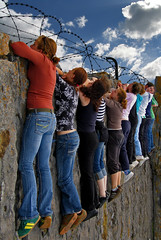...that doesn't love a Wall
“Before I built a wall I’d ask to know
What I was walling in or walling out,
And to whom I was like to give offense.
Something there is that doesn’t love a wall,
That wants it down…” – Frost.
Quite awhile back a friend and I were talking and he noted that I tended to live in the future. In a voice of curiosity he asked me, “What do you gain or lose by doing so?”
I lose the present. And I lose what’s happening in the people around me.
If I am honest… living in the future is a wall built. If I can plan for the future, I can protect my interest, right? The future-living was nothing less than a survival tool learned by a boy to navigate a slew of uncertainty alone. Walling in what I thought I could control. Walling out anything and anyone that might make the landscape more threatening, or treacherous.
My American culture says this is a good thing, though. Boundaries! People, we must define and stay in personal boundaries, right? And so we are a nation of isolated and lonely individuals all staring at our drinks shoulder to shoulder in a packed cocktail party, or crying in the mirror in some side-room like some Manhattanite in “Breakfast at Tiffany’s.”
But I am moving back towards that place in the heart that doesn’t want as many stones stacked for walls. Growing up seems to bring with it higher walls, and keeping those stones in place gets wearing. Growing young, though, has the child’s heart at core and “Something there is that doesn’t love a wall, that wants it down,” wrote the Poet. In wanting my walls down, I tend to remove the bricks in your walls too. It’s infectious and admittedly sometimes invasive, but “good fences” DON’T make good neighbors – that’s the point of the poem, after all. It just means I have to step more into the grace of my humanity, and so do you.
What I was walling in or walling out,
And to whom I was like to give offense.
Something there is that doesn’t love a wall,
That wants it down…” – Frost.
Quite awhile back a friend and I were talking and he noted that I tended to live in the future. In a voice of curiosity he asked me, “What do you gain or lose by doing so?”
I lose the present. And I lose what’s happening in the people around me.
If I am honest… living in the future is a wall built. If I can plan for the future, I can protect my interest, right? The future-living was nothing less than a survival tool learned by a boy to navigate a slew of uncertainty alone. Walling in what I thought I could control. Walling out anything and anyone that might make the landscape more threatening, or treacherous.
My American culture says this is a good thing, though. Boundaries! People, we must define and stay in personal boundaries, right? And so we are a nation of isolated and lonely individuals all staring at our drinks shoulder to shoulder in a packed cocktail party, or crying in the mirror in some side-room like some Manhattanite in “Breakfast at Tiffany’s.”
But I am moving back towards that place in the heart that doesn’t want as many stones stacked for walls. Growing up seems to bring with it higher walls, and keeping those stones in place gets wearing. Growing young, though, has the child’s heart at core and “Something there is that doesn’t love a wall, that wants it down,” wrote the Poet. In wanting my walls down, I tend to remove the bricks in your walls too. It’s infectious and admittedly sometimes invasive, but “good fences” DON’T make good neighbors – that’s the point of the poem, after all. It just means I have to step more into the grace of my humanity, and so do you.
